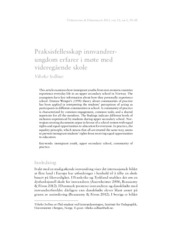Praksisfellesskap innvandrerungdom erfarer i møte med videregående skole
Peer reviewed, Journal article
Published version
Permanent lenke
https://hdl.handle.net/1956/9109Utgivelsesdato
2013Metadata
Vis full innførselSamlinger
- Department of Education [300]
Sammendrag
This article examines how immigrant youths from non-western countries experience everyday life in an upper secondary school in Norway. The youngsters have key information about how they personally experience school. Etienne Wenger’s (1998) theory about communities of practice has been applied in interpreting the students’ perceptions of acting as participants in different communities in school. A community of practice is characterized by common engagement, common tasks and a shared repertoire for all the members. The findings indicate different levels of inclusion experienced by students during upper secondary school. Norwegian steering documents argue in favour of a school system with equal rights and equal opportunities to education for everyone. In practice, the equality principle, which means that all are treated the same way, seems to prevent immigrant students’ rights from receiving equal opportunities to education.
